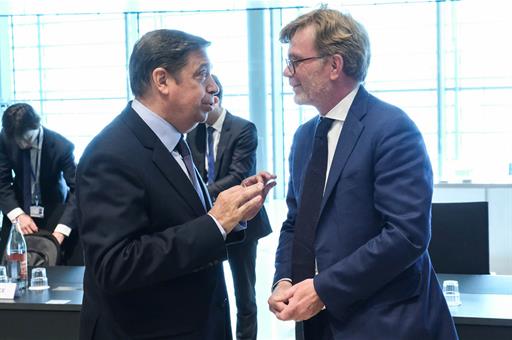EU Council of Agriculture and Fisheries Ministers
Planas: We must now move on to the concrete debate on "mirror clauses" for the European Commission to set out lines of action
News - 2022.6.13
For the minister, the principle of reciprocity or "mirror clauses" should govern the negotiation and revision of EU trade agreements. He stressed that at EU level a more concrete debate must be initiated so that the European Commission can set out lines of action.
Luis Planas today attended the EU Council of Agriculture and Fisheries Ministers in Luxembourg, where he pointed out that more ambitious standards are not only in the EU's interests but contribute to the achievement of legitimate objectives on global issues, in line with the One Health approach.
Planas stressed the need to establish concrete reciprocity measures if we want our farmers to have similar competitive conditions and that the positive environmental effects sought by the "Farm to Fork" strategy should not be replaced by higher emissions from outside the EU.
In this respect, the minister will ask "that we move from abstract debate to concrete debate", so that the areas in which the so-called mirror clauses can be applied are identified and the European Commission can subsequently determine the strategy it is going to follow in international organisations to reach agreements on this matter.
With regard to the situation of the agricultural markets, which are highly affected by the rise in prices and their high volatility, especially since the invasion of Ukraine, the minister stressed the need to keep a constant watch on the situation of prices and stocks. The estimated world cereal harvest is around 2.25 billion tonnes, 40 million tonnes less than the previous season, but enough to feed the entire population, he said.
In this respect, "the measures we can take at the international level are absolutely key". Among them, he suggested improving the transparency of international market data, analysing how to re-establish communication channels for grain and sunflower outflows from Ukraine and coordinating international food crisis prevention measures. He also considers it essential to achieve a regular supply of fertilisers.
"Ensuring global food security will require our continued commitment and a thorough review of the factors that can contribute to food security," he said. The minister assured that for food security initiatives to be effective, it is essential that the market for agricultural products remains open and that no unilateral trade policy measures are taken.
Regarding the Common Agricultural Policy, Spain will submit the final text of the Strategic Plan in July for approval in the summer. For the minister, "it is very important to maintain the strategic direction of this new CAP from the point of view of sustainability, which must not be at odds with business competitiveness". Therefore, "we must adopt the necessary measures from the point of view of making the application of the CAP more flexible, to take into account the current context", he added.
Another issue discussed at the Council was the current situation of African Swine Fever, which has spread in some European countries largely due to the movement of wild boar populations.
The Minister pointed out that surveillance and control of these populations must be a priority for all Member States to minimise their advance. He also highlighted the efforts of the European Commission in funding projects to research and develop a vaccine against this disease.
The Council also took stock of the state of play of discussions on the new rules on geographical indications and held a first discussion on the rules concerning the sustainable use of plant protection products, the legislative proposal for which is expected to be presented by the Commission during June.
Improvement of fisheries
During the Council, the European Commission presented its Communication on the state of play of the Common Fisheries Policy and the consultation on fishing opportunities for 2023.
The Minister considers it excellent news that the biological situation of fishery resources of interest to the Community fleet is continuing to improve overall. He said that this situation is largely due to the efforts of the fishing sector.
In addition to the good and stable situation of the Atlantic fisheries, the minister has valued the improvement of the state of stocks in the Mediterranean. In view of this situation, he considers it necessary that decisions on these waters be taken on the basis of recent scientific information. Planas hopes that the progressive and balanced approach that Spain has been demanding will become a reality.
In view of the debates on the current Common Fisheries Policy (CFP) and its possible reform, the minister insisted on the need to reinforce such essential elements as generational replacement, guaranteeing food supply, improving the conditions of activity, equal treatment of our fleets with other external fleets and international governance.
The Council also reviewed the state of play of the programming of the future European Maritime Fund for Fisheries and Aquaculture (EMFF). In this respect, the minister called for reflection so that the FEMPA regulation favours fishing vessels gaining in energy efficiency and reducing their dependence on fossil fuels. Improving vessels in this regard will have an impact on the necessary generational change in the fishing sector.
Non official translation





